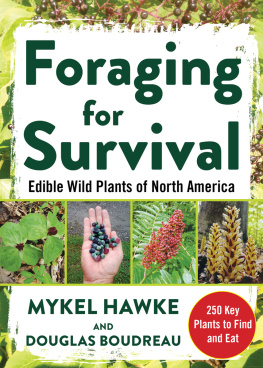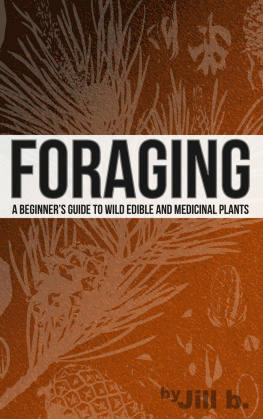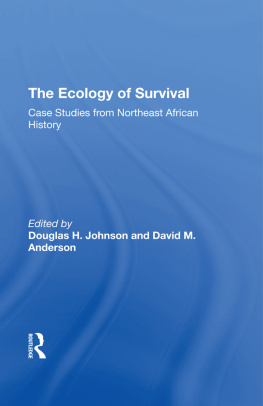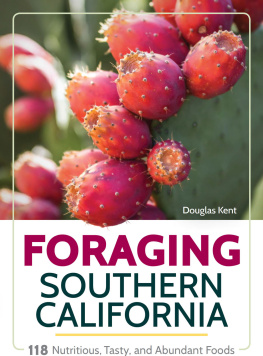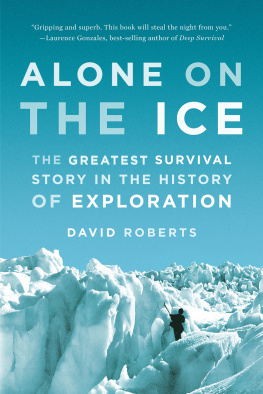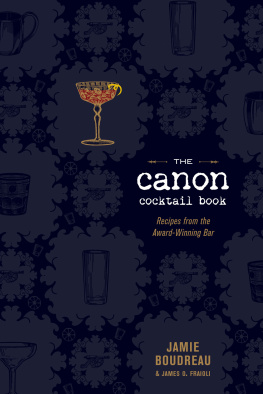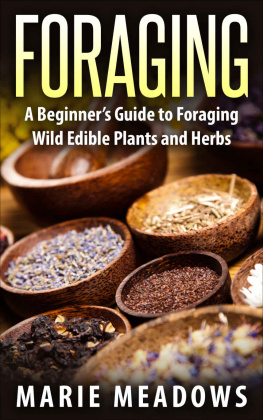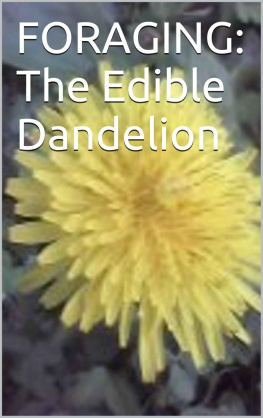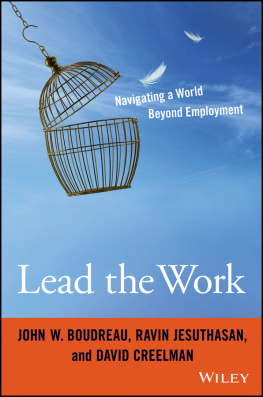Douglas Boudreau - Foraging for Survival
Here you can read online Douglas Boudreau - Foraging for Survival full text of the book (entire story) in english for free. Download pdf and epub, get meaning, cover and reviews about this ebook. year: 2020, publisher: Skyhorse, genre: Romance novel. Description of the work, (preface) as well as reviews are available. Best literature library LitArk.com created for fans of good reading and offers a wide selection of genres:
Romance novel
Science fiction
Adventure
Detective
Science
History
Home and family
Prose
Art
Politics
Computer
Non-fiction
Religion
Business
Children
Humor
Choose a favorite category and find really read worthwhile books. Enjoy immersion in the world of imagination, feel the emotions of the characters or learn something new for yourself, make an fascinating discovery.
- Book:Foraging for Survival
- Author:
- Publisher:Skyhorse
- Genre:
- Year:2020
- Rating:4 / 5
- Favourites:Add to favourites
- Your mark:
- 80
- 1
- 2
- 3
- 4
- 5
Foraging for Survival: summary, description and annotation
We offer to read an annotation, description, summary or preface (depends on what the author of the book "Foraging for Survival" wrote himself). If you haven't found the necessary information about the book — write in the comments, we will try to find it.
Foraging for Survival — read online for free the complete book (whole text) full work
Below is the text of the book, divided by pages. System saving the place of the last page read, allows you to conveniently read the book "Foraging for Survival" online for free, without having to search again every time where you left off. Put a bookmark, and you can go to the page where you finished reading at any time.
Font size:
Interval:
Bookmark:



Foraging has real and potential hazards and risks. Consult your local foraging experts to ensure that plants have been properly and safely identified prior to consumption. Many false plants may be confused for safe-to-eat plants. This book is not a field guide; it is a book about using edible plants in survival planning. Be smart and be safe.
Copyright 2020 by Douglas Boudreau and Mykel Hawke
All rights reserved. No part of this book may be reproduced in any manner without the express written consent of the publisher, except in the case of brief excerpts in critical reviews or articles. All inquiries should be addressed to Skyhorse Publishing, 307 West 36th Street, 11th Floor, New York, NY 10018.
Skyhorse Publishing books may be purchased in bulk at special discounts for sales promotion, corporate gifts, fund-raising, or educational purposes. Special editions can also be created to specifications. For details, contact the Special Sales Department, Skyhorse Publishing, 307 West 36th Street, 11th Floor, New York, NY 10018 or .
Skyhorse and Skyhorse Publishing are registered trademarks of Skyhorse Publishing, Inc., a Delaware corporation.
Visit our website at www.skyhorsepublishing.com.
10 9 8 7 6 5 4 3 2 1
Library of Congress Cataloging-in-Publication Data is available on file.
Cover design by Tom Lau
Cover photo credits: Getty Photos, Doug Boudreau, Mykel Hawke
Print ISBN: 978-1-5107-38331
Ebook ISBN: 978-1-5107-3835-5
Printed in China
Table of Contents
Disclaimer
In any situation that could be deemed a survival scenario, the laws are relaxed on foraging even on protected land. However, the act of foraging aside from that is mildly prohibited in most jurisdictions and more so in others. Doug teaches what we can forage on, if we have to someday, but only encourages experimentation on edibles for the purpose of becoming familiar with them, how to prepare them, and what they taste like. Doug completely discourages using wild edibles for regular use. It should be a knowledge useful to our survival and be experimented with once identification and preparation requirements are 100 percent certain. Minors should never attempt to forage for wild edibles without adult supervision . No one can be held responsible for any mistakes made in any way by anyone using this guide as a reference, as no one will put wild plants in your mouth but you. The reader assumes full and all responsibility for his or her own health. Neither the authors nor the publishers are liable for any illness or discomfort the reader may experience while using this book. Use caution and common sense!
Please understand that there are so many variables and variations when it comes to wild edibles. Some plants may have pesticides on them. Some may have some sort of disease or fungus. Some plants may simply have dirt or animal excrement on them. Any one of those substances alone could cause illness in humans. Some plants may have very close looking kin that are not edible. Some plants may be evolving as new subspecies. It is for these extremely varied and highly possible reasons that foraging for wild edibles must be approached with a great deal of precaution and common sense.
Even with an expert right beside you, to make a 100 percent positive identification of the plant, it would not be humanly possible for the expert to know if some mosquito control insecticide might have been sprayed in that region, as but one example of some of the realistic possible dangers and risks. It is also for this reason that Doug and I encourage you to study, learn, and practice enough to know what you need, but not to make it a regular habit of wild foraging, unless you know the area and can wash your edibles. Otherwise, its better to learn what is around your area where you live, work, or travel and then try to grow some of those native plants in your own yard, where you do know the environment under which the plants grow and you can control the history of any herbicides or pesticides, in order to make the enjoyment of wild edibles the safest experience possible.
Its also important to realize that plants have life cycles, too. That means you should learn the plants in their varied forms from winter, spring, summer, and fall. Some plants are not fully ripe and ready to eat until the second or third year, and some dont produce edible substances after so many life cycles. You must learn, study, research, and memorize anything you may put in your mouth. No one book or source can teach you everything. Maximize all the resources you havebooks, the web, locals, farmers, experts, scientists, the animals and any other source you can learn from. Hopefully, this is a good resource and a start on a lifelong journey of learning that will never end as long as you live. Thank you and happy foraging!
Foreword
I first became friends with Doug Boudreau through our mutual interest in wild edibles and our mutual respect for Green Deane and his excellent videos, blogs, and website (eattheweeds. com). I was a newcomer to living in Florida, and I was amazed at how much I didnt know. Decades of study in edible and medicinal plants seemed insufficient for the diversity of flora and fauna in the unique terrain found in the peninsula of Florida.
I found many North American plants and Central American tropical plants that seemed to have come together with other international transplants to make seemingly entirely new sub-species, and it made me unsure about many of the plants that now surrounded me.
This is where Doug came into my life. As a native country boy, he grew up learning, being taught, studying, and seeking knowledge on all these special Florida plants. As such, he had a great many trials and errors, and his efforts included a lot of research and querying of other experts. Doug has put in a great deal of painstaking and sometimes just painful work into learning all he could.
Now, Mr. Boudreau has compiled all his years of work and learning into this great book and combined it with my knowledge from living, traveling, and studying all over the world, learning ancient knowledge from local experts over decades of time. And, much in the ways of the Native American traditions, of learning and handing knowledge down to be built on and passed on to the next generation, the knowledge here is neither perfect nor complete. However, it is vast, well done, and a great place for anyone to begin learning about the amazing, useful plants that surround them.
Consider this book a resource of good country knowledge. Learn, study, build on and pass on this knowledge, as it is sure to be helpful.
Mykel Hawke
Special Rules
One of the most important rules of eating plants is proper research. Read all you can in books and online. Learn from experts, others with real, local, learned, tried and tested knowledge. For example, lets say your grandmother may not know much about farming, but she may have been taught by her grandmother that a certain plant is edible. If she grew up eating it, then she has decades of real experience, and if she demonstrates this to you and then you repeat a few times with no ill effects, then that is real knowledge, regardless of books, science, and experts.
Also, be sure to look at as many photos as possible, especially of the plants in different seasons, soils, and regions. Look at videos if you can and also look at images for all the stages of growth. In short, do your utmost to properly and positively identify any plant before you consume it.
Next pageFont size:
Interval:
Bookmark:
Similar books «Foraging for Survival»
Look at similar books to Foraging for Survival. We have selected literature similar in name and meaning in the hope of providing readers with more options to find new, interesting, not yet read works.
Discussion, reviews of the book Foraging for Survival and just readers' own opinions. Leave your comments, write what you think about the work, its meaning or the main characters. Specify what exactly you liked and what you didn't like, and why you think so.

